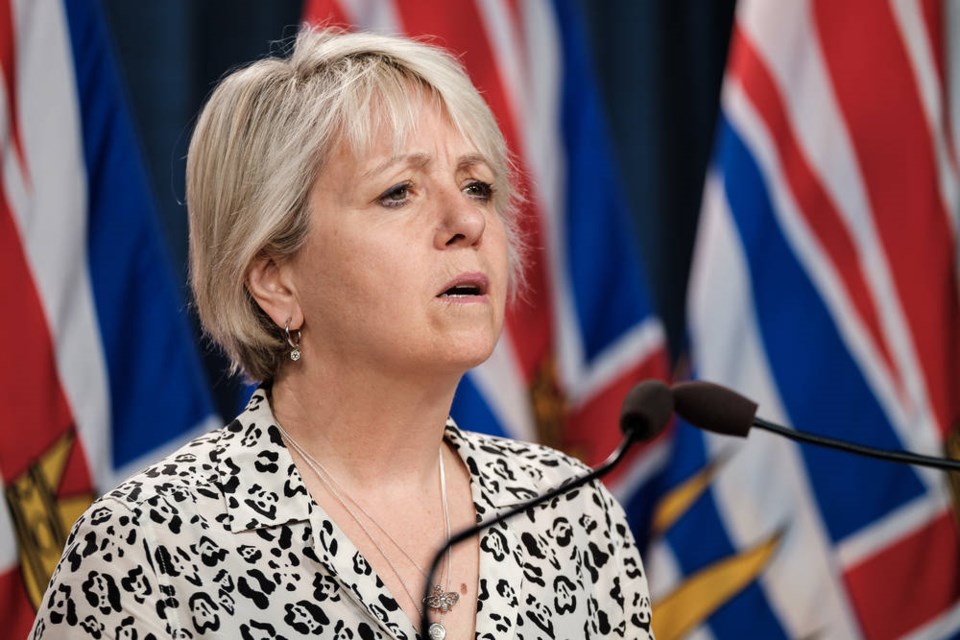B.C. is considering decreasing the interval between first and second doses of COVID-19 vaccine as supply ramps up, says the province’s top doctor.
More than a million doses of vaccine are expected to arrive in May, with more scheduled to come in the following months.
“This is good news for all of us. It means that everybody who’s eligible — so right now that’s down to age 16 — will have access to a vaccine before Canada Day, and we think significantly before that,” Henry said, noting mid-June is the target, barring unforeseen delays.
With the new increased supply, the province is considering shortening the interval between shots to less than 16 weeks for most people, Henry said.
On March 1, the province announced that second doses would be delayed until four months after the first — well beyond the 42 days in B.C.’s previous plan and the 21 to 28 days recommended by manufacturers. The decision was based on lack of supply and the fact that the first dose of the Pfizer-BioNTech, Moderna and AstraZeneca vaccines provides more than 80 per cent protection when it comes to preventing serious illness and death.
The province reported 2,174 new cases of COVID-19 in B.C. over the weekend, including 61 new cases in Island Health.
There are now 7,327 active cases. Of those, 474 are in hospital, including 176 people in ICU or critical care.
Hospital admissions were down over the weekend, but B.C. Health Minister Adrian Dix said the number of people in hospital and in intensive-care units as well as the number of postponed surgeries remains too high. “The pressure on our health-care system is too high, way too high.”
There were also 15 deaths over the weekend, including one in Island Health. All of those who died were over the age of 70, with the exception of one person in their 50s. Most were in hospital.
There are eight outbreaks in long-term care, assisted living and independent living and three outbreaks in acute care.
Henry said the focus of the province’s vaccination program continues to be to protect as many people as possible with a first dose to reduce transmission of the virus and hospitalizations.
To date, 1.7 million people have been vaccinated in B.C. — 41 per cent of those eligible.
The province is now booking vaccine appointments for those 54 and older, and by week’s end it will be 50-plus.
Everybody in B.C. who is 18 and older is eligible to register for a COVID vaccine at gov.bc.ca/getvaccinated or 1-833-838-2323. Registering on the government age-based program, which uses Pfizer and Moderna, is the most efficient way to get vaccine, said Henry.
About 2.1 million people have registered so far, less than half the 4.3 million B.C. residents who are eligible. That number “needs to be significantly higher,” Dix said. “We need to do better. We need people to register.”
Those who have received a vaccine through a workplace program or pharmacy should also register, Henry said.
There have been glitches in the online program — hospital workers who might have already had their vaccine getting notice to book a first dose as part of the age-based system, for example — and they are being worked out, said Henry, adding there are bound to be more hiccups as another million vaccines are administered in the coming weeks.
Canada is preparing to make more AstraZeneca available for people who received AstraZeneca as a first shot, said Henry. Studies continue around the world to determine if vaccines from different manufacturers can be used for first and second shots.
“It may turn out that it is a better, stronger immune response to receive a second dose with a different vaccine,” said Henry. “We don’t yet know that, but it could be that we’ll be able to provide the mRNA vaccines, like Pfizer or Moderna, as a second dose for people who’ve received AstraZeneca or vice-versa.”
Henry still advises people to take the first vaccine that’s available to them.
“In some ways, we’ve been building a spaceship as we’ve been flying it, and we’re now entering into a new era, and new warp speed if you will, and there’s bound to be bumps along the way,” said Henry. “We will adjust.”
Rates of transmission are slowly decreasing, despite the high number of hospitalizations and ICU admissions, said Henry. “We don’t want another upward climb, and we know that that can happen if we take our eye off the end game too soon.”



